Mette Ivie Harrison's Blog, page 57
November 5, 2012
Alternate Panel Titles for Writers' Conferences
Why good books are good and bad books are bad.
Why I am smarter than everyone else on the panel and in the world
Everything women write is good and everything men write is bad, but this isn't sexist
How to be more like me.
Why all my life choices have been validated by my success
The panelists have no idea why they are here and neither do you.
Rambling and off-color jokes by major authors
All the women who write those “romance/YA/touchy-feely books” in one panel to get them out of the way.
All the “diverse” authors who will only be allowed on the diversity panel because all diverse books are only about diversity.
The one token female who will be immolated live for your entertainment.
Two panels going on at the same time—who can tell which is which?
The unintentionally hilarious panel.
The no-planning involved panel, so just ask us questions.
Mumble, mumble, mumble panel where no one uses the mics.
This panel topic is so boring it will be hijacked by something else.
Big words will be used on this panel for no other reason than to make the audience feel stupid.
Name dropping seminar—how to do it well, and badly.
All my books in the first ten minutes or less.
A long description of every book every author on the panel has ever written.
This is what people look like who drank too much, slept too little and woke too early.
Obscure panel on author no one reads anymore
Panel suggested by big name who then cancelled appearance
The fourth panel on the same topic, with a “new” twist.
Self-pubbed author panel.
Random anecdotes that will be alternately amusing.
Panelists who laugh at in-jokes no one else gets.
First panel of the day on a topic considered “unimportant.”
Obligatory vampire panel.
All the unhappy authors panel.
One crazy author panel.
All the panelists who agreed to be put up against Neil Gaiman's reading.
Men who cannot stop speaking and the women who have to put up with it.
Panel of awkward silence.
All about crystals, rainbows, and unicorns.
My books don't sell because they are “classics” and meant “for the ages.”
Why Twilight was the worst book ever written (even though I have never read it)
Only come to this panel is you already agree with what the panelists say.
November 1, 2012
Why Writing a Novel is Like Running 50 Miles--Part 4
What you really need right now is an aid station.
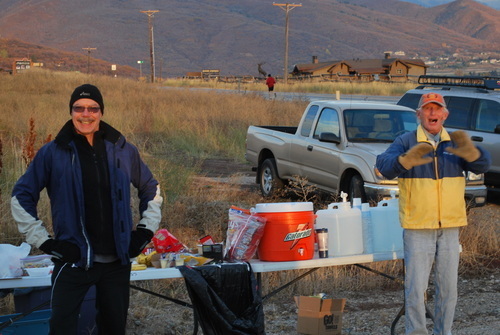
There is nothing like seeing happy, cheering faces when you are at a race. And when these people have the sole purpose of making sure that you get anything you need, those miles do seem just a little bit easier.
While doing the 50 mile race this year, I asked for the chance to get inside one of the vans to put my hands to the heater. Then the nice driver offered me her warmer gloves (which I accidentally took home at the end of the race). She offered me her hat and her coat, as well (which I didn’t take.)
At other races, I have had people take off my socks and shoes, clean my stinky feet and put new socks on (not mine) after bandaging my feet thoroughly.
I’ve had people stay with me to help me get through a really bad mood, walking up a long hill when they would probably have preferred to run it.
This year, I had to stop with terrible stomach cramps and ended up collapsed at the side of the road. A car drove up and a man got out to ask me how he could help. At first I thought he was just a random, kind stranger. But he actually had salt tablets and chicken broth in his car and they helped me just that tiny bit more to get up off the ground and keep going.
In writing, you need aid stations, too. When your novel feels like it has fallen and it can’t get up, there are friends out there who will read it and tell you that they love it despite its flaws, that you should keep working on it.
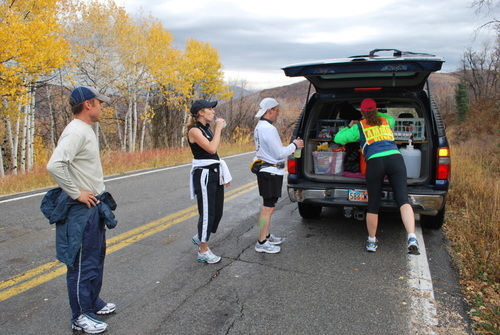
There are also people who will simply make you laugh about life and about being a writer.
There are writing retreats you can go to, or you can make your own. Or you can just get a phone call or an email from someone who understands.
But it’s not just writers who can be your aid stations. Your family (hopefully) even if they aren’t writers can do things like listen and tell you they love you. They can tell you that they are proud of you.
If you are in need of an aid station, ask for it. Don’t suffer in silence. Everyone has been at a low point and needed cheering. Or get yourself a mini aid station by going out and getting chocolate or whatever makes you feel like keeping going.
Buy yourself a card. Celebrate every mile, on a run, as well as on the writing journey to the end. I’m not talking about when the book gets published, either. Although do that, too. Celebrate that you got through this day.
When I first started racing, I did a number of races that didn’t have T-shirts or medals or anything. There was no award for finishing. And I decided that I deserved an award, so I went on-line and bought myself a few medals for those races. It seems silly, but I still have those early awards and they still matter to me. Those races were hard and I deserved something, so I got it for myself. I paid $5 for a little medal and so what? I’m needy.
I take my kids out to dinner any time I sell anything (sometimes only ice cream). I remember my friend Janni Lee Simner said that she decided one day that no one was ever going to give her a certificate that said “Real Writer,” so she made one herself. Do that.
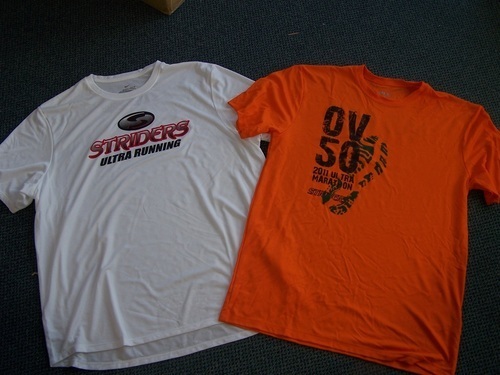
October 31, 2012
Why Writing a Novel is Like Running 50 Miles--Part 3
So you keep going, and then suddenly you realize, you have to pee.
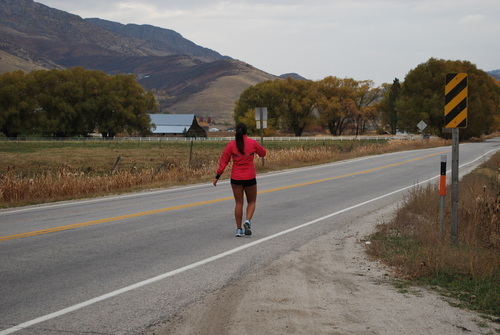
But there are no porta potties in sight. And you feel embarrassed. You try to keep going, but it’s no use. You find a bush.

As a writer, you also hide the ugly truth as much as possible.
Surely no one else steals ideas from TV shows or movies.
Or writes everything down in the wrong point of view and then has to fix it.
Or cuts out a full 250 pages from a manuscript because he has gone off in the wrong direction.
Or has to hire a babysitter to write when her kids are already in school full-time.
Or has to go on a writing retreat to a completely different state.
Or has to hire someone to turn off the internet for days on end, or you will get nothing done.
You come back from taking care of the ugly business. The book is finished. But you look around, and there’s no one anywhere. And there’s a storm brewing.
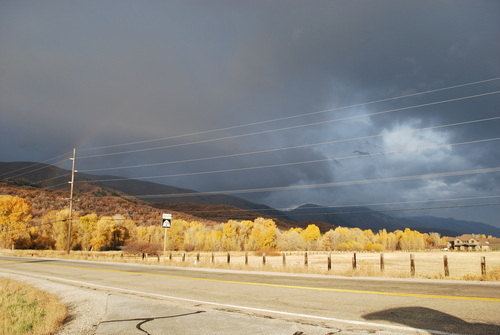
The book still isn’t working as well as you thought and you have no idea what to do. Aren’t writers supposed to know what to do? You keep reading through it. You can see what’s wrong, but you can’t see how to fix it.
You feel completely alone.
You make yourself go down to your office every day. You type words into the computer, but you have no idea if you’re actually making progress.
You wonder why you thought you wanted to do this job anyway.
Isn’t this just a way to make people crazy? Stuck in a windowless room, with no contact from the outside world except on the internet, and the only food is candy bars you know you shouldn’t be eating.
You want to get out, but you know you have to keep your butt in the chair. You have to keep at this, no matter how much it hurts.
October 30, 2012
Why Writing a Novel is Like Running 50 Miles--Part 2
The easy feeling is over. You look up and notice that everyone is starting to pass you.
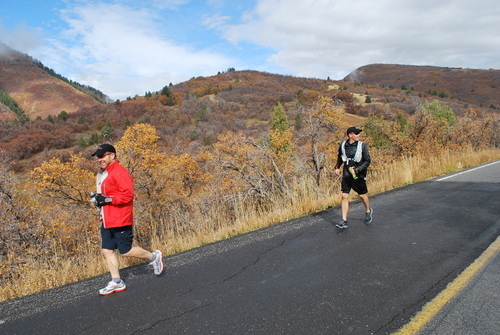
In writing, this can happen before you’re published, but it happens after you’re published, too.
Look, that person got an agent and a big deal with the first novel she wrote.
That guy got a deal when he was still in college.
I’m the only person in my writing group who hasn’t sold a book, and we all started ten years ago.
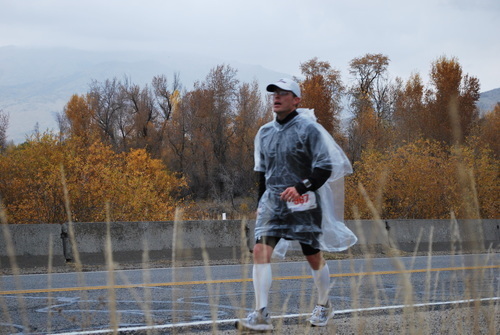
And just when you think that you’re at your worst, walking slowly and not sure if you are getting anywhere, it starts to hail.
This is my third book and I still haven’t broken out big yet.
My friends are all winning awards and all I get are sales numbers.
My friends are all selling big, but all I get is awards.
My agent has fired me because he hates my new book. My life as a writer is over.
A big name author has taken the time to review my book on-line—badly.
It happens to everyone. It may seem like it is only happening to you, but that’s the lie. Everyone has good times and bad times.
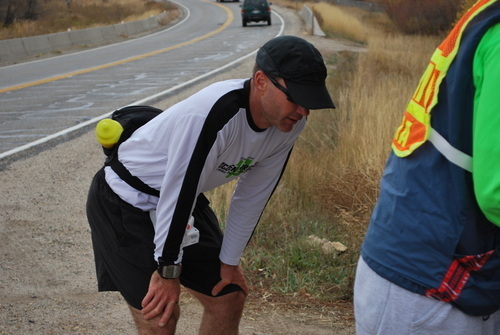
On an ultra run, there are times when you will be feeling great and times when you will feel like crap. Just get through the crappy times.
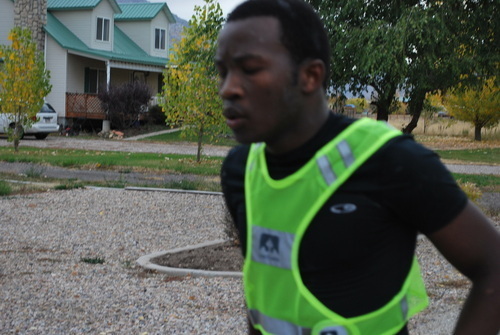
There’s no magic, no secret. You just feel like crap and then you don’t feel like crap anymore. But you will again.
Just like people who think there is some special handshake that will get them published, there is no special magic that keeps you getting published, or makes you a best seller or an award winner.
You just write the books (make the donuts). You sit down and some days your books won’t work. You may figure out how to fix them. You may not. You may erase a week’s work. You may stop writing for a month. Or a year.
And then you write again, head down, no reason to believe it’s going to be good this time except that you’re tough and you know that there used to be something in all of this that you really liked, and you’re determined to find it again.
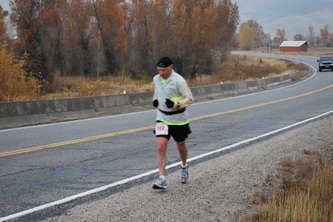
October 29, 2012
Why Writing a Novel is Like Running 50 Miles--Part 1
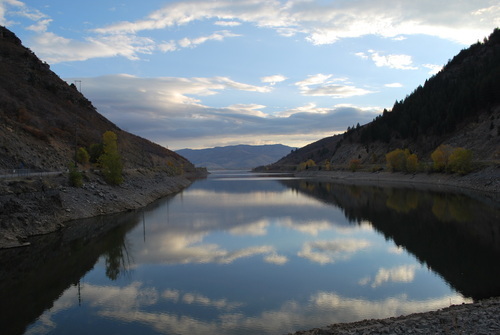
At the beginning, you think:
“This is going to be the best novel ever written! This is my life’s work! When others write novels after me, they will think of my novel and say, ‘that is a real novel! If only I could write a novel half as good, I would die happy!’”
At the beginning of a 50 mile race, you’ve been tapering for weeks. You’ve done some killer runs, over marathon distance even. You’ve suffered, and you know what suffering is about. Right?
If you’ve written a novel before, you think—I know how to do this. I know how to suffer. I know how much the middle part hurts. I know how to make myself get though the bad patches. I’ve done it before and I can do it again.
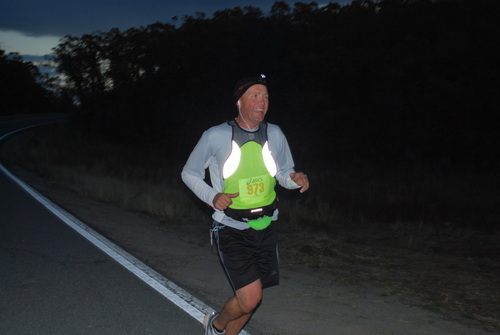
In a race, everyone is smiling those first few miles. You feel like you can go forever like this, which is good, because 50 miles is actually about 20 miles past forever.
In novel writing, you want to query agents or editors because this is going to sell a million copies. This is going to be bigger than The Hunger Games or Harry Potter or Twilight, combined!
(This is also why agents and editors mostly don’t want to hear from you if you haven’t finished the novel. Everyone thinks that they can finish 50 miles faster than they can do it. They hear about doing 15 minutes per mile or 20 minutes per mile and think how easy that is. It IS easy. For the first 5 miles. The race doesn’t even really start until mile 30, though. In novel writing terms, that means about page 200.)
This is the big picture:

It looks awesome, doesn’t it? Running down it is awesome. It’s the running back up, when you’re already got 40 miles on your legs and your heart that it’s going to hurt. But that’s all right. Don’t think about that now. Just enjoy the view. Have fun with your first 20 pages. That’s the addiction that keeps you coming back.
October 28, 2012
OV50 2012 race report
This is the sixth—and worst—year for this race. Some of the reasons why:
1. Cold weather. It’s been cold before, and it has even hailed and snowed. But this year it was so cold my water bottle around my waist froze and my gloved hands hurt so badly I worried I was getting frostbite. One of the guys said he took off one of his three coats and wished he hadn’t. We kept going through foggy area and the guys would end up with icicles coming off their beards. I had dripping ice all around my waist where I’d been sweating. About 3:00 p.m. it finally got nice enough I took off one of my layers.
2. Gastric distress. There were only about 4 porta potties on the course and I needed one every 10-15 minutes. At one point, I was in so much pain that I actually laid down in the road for a while. I’d been telling myself up until then that if I just kept walking, I would make it before the cutoff. But lying in the road was not going to get me there. Some runners came by and thought I’d been hit by a car and that was exciting. Then one of the race support vehicles came by and I veered from my plan of only having water and gu’s and had some salty chips, which tasted pretty good. I came home convinced I was sick, and yup, I was right. Fever of 101.
3. Walking like a tortoise. I realized that any running until the very end was going to risk me not finishing. So I walked about 12 more miles for the next 3.5 hours. I wanted to finish. I was definitely the tortoise and not the hare. There might have been a couple of people who finished after me, or maybe only one. My finish time was terrible, but on the other hand, I got third place of the women. There were only 4 of us at the start (and only 20 runners overall—it’s a tiny race). One woman ended up unable to continue at mile 27. She was way ahead of me and had just had a baby 3 months ago. But still, I’m counting it as a win.
The good parts of the race:
1. 17 came and paced me the last 10 miles of the race, 4 of those walking, but I ran the last 6 at about 10 min/mile pace which is pretty fast, considering. We had a good talk and it was good to have her experience the race. She’s never seen the 50 miler up close before. After the race, one of the racers asked her how many miles she paced me. She said “only ten miles.” He laughed at that “only” and I knew that “my work here is done.”
2. Ran about 13 miles with one of the women, close to my age, has 5 kids, and we swapped stories about our experiences and our families. At one point she said, “Wow! You should write a book.” I laughed and told her that I have, in fact, written, quite a few books.
October 26, 2012
Friday Tri: Ready for Off-Season
In a way, I think that everyone needs a kind of off-season, no matter what their goals are. Writers need time when they aren't on deadline. Teachers need the summer to fill up on the enthusiasm for the new year. I sometimes have been to a retreat for all kinds of artists in Utah and we just sit around and talk about art and why we do what we do. It's enormously exciting, creatively, to see the world from this different point of view, to not be working, but be thinking, re-evaluating, reconsidering, and being surprised by the world again.
I am considering a few things for next year. One is hiring a coach, and using the money I have been spending on doing an Ironman a year for that. Wondering if that might be a better use of time and money, instead of hitting my head against the brick wall over and over again. Maybe I need a new perspective. Also wondering if I need more social interaction with other triathletes. And if I can find a way to do races at a "fun pace," rather than full race pace. I'd like to be able to talk more friends into racing, and if I could bring myself to just do a race with them instead of for myself, that might work. It might bring me more satisfaction than a PR.
Random thoughts, but gradually, I'm hoping they become less random and turn into a rejuvenated outlook on the new year of triathlon and life.
October 25, 2012
What if my book doesn't sell?
This is utterly stolen from Neil Gaiman’s commencement speech earlier this year, but at least if your book doesn’t sell, you will have written a book that mattered to you and that you are proud of.
Or you could write a book you think will sell, that you don’t really care about. You might possibly get paid, but may be embarrassed that you wrote the book and years later, you will wonder why you wasted your time on that book.
The older I get, the more conscious I am of the fact that there are only so many books that I am going to be able to write. Almost all the writers I know have long lists of books they want to eventually get to, but the reality is a book a year or two books a year, or however many you can write—there’s a limit. You can’t write good books while you’re so young that you’re learning. And you may not be able to write books past a certain age. You’ve got this window of maybe twenty or thirty years if you are lucky where you can write well the books that truly matter to you. Use those years wisely. Pick your books wisely.
And two quotes:
“There is no more hollow feeling than to stand with your honor shattered at your feet while soaring public reputation wraps you in rewards.”
“Reputation is what other people know about you. Honor is what you know about yourself.” Aral Vorkosigan in A Civil Campaign.
October 24, 2012
Writing Wednesday: Relationships
1. Do I begin the novel with a sense that this character has relationships with friends and family, past and present?
2. If a character does not have friends, is there a good reason for this, other than the convenience for me as an author, not needing to write backstory?
3. If a character has no family, have I really thought carefully about the consequences either an orphaned life or a loss of family would have on this character?
4. Is this relationship realistic? Do the characters tease each other and see each other's flaws and virtues like people in a real relationship do?
5. Is there humor in the relationship? Even autistic people have some sense of humor, and it ought to come out. We humans need humor to relieve the darkness in our lives. When it isn't there naturally, we make it up.
6. Is there a conflict in the relationship? There are always conflicts in relationships, believe me. You as the author can choose whether or not to make them obvious from the first or put in more subtle hints. These conflicts are great for creating problems between the characters later on, when the stakes are really big.
7. If these people do not actually care about each other, is there a reason that they remain in relationship with each other? I ask this because occasionally a relationship feels so horrible that I can't see why someone would remain in it. People do stay in bad relationships, but they also have reasons for doing so.
October 23, 2012
10 Biggest Mistakes I See in Begining Writers' Manuscripts
1. Lack of pacing, especially trying to tell too many scenes too quickly.
2. Starting with something really big that has no context and means nothing.
3. A lack of relationships that matter.
4. World building jargon that takes long minutes to parse through.
5. An evil villain who is Snidely Whiplash.
6. Telling too much backstory all at once. (My rule is one paragraph at a time.)
7. Good, meaty dialog that shows conflict between characters (rather than backstory).
8. A sense of layers. This can be a sense of humor or a great voice or foreshadowing.
9.Telling part of the story that feels like filler because someone else told them they had to.
10. Not knowing where to start and so starting in about five different places, one after the other. There is only one beginning.
Mette Ivie Harrison's Blog
- Mette Ivie Harrison's profile
- 436 followers



